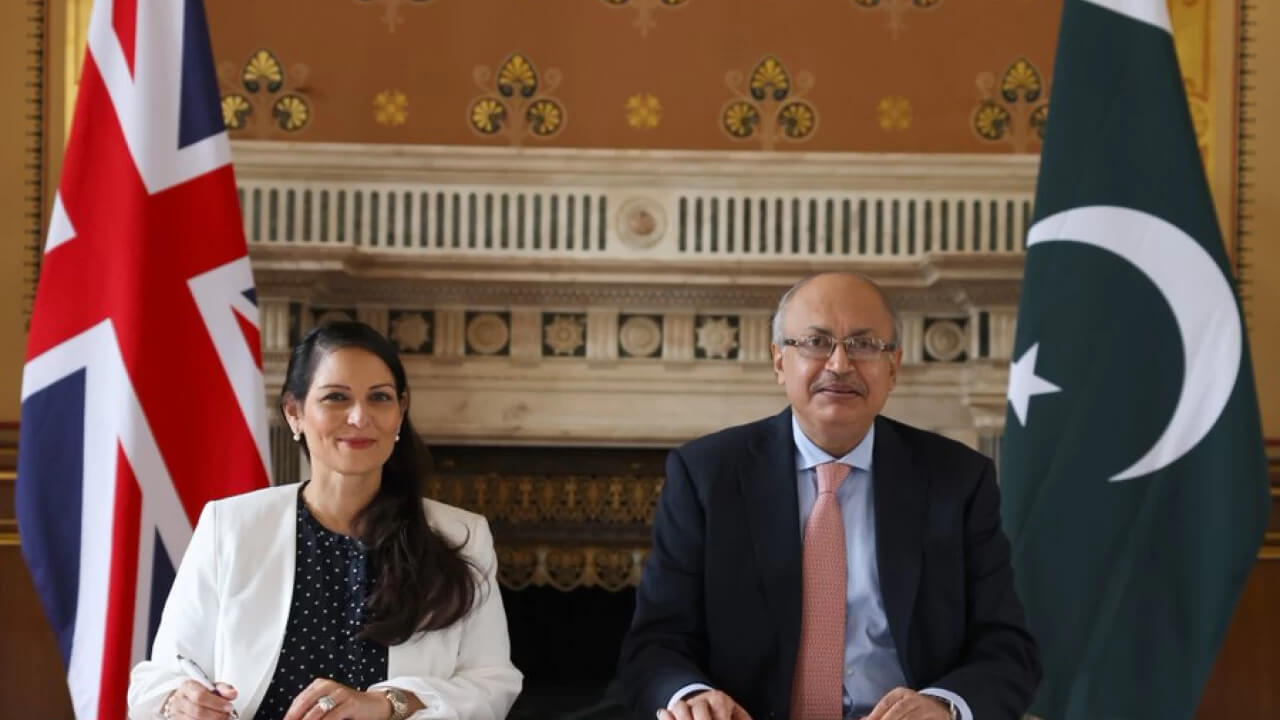The United Kingdom (UK) and Pakistan signed a deal to facilitate the return of foreign criminals and immigration offenders back to Pakistan, marking the fifth such agreement introduced by the British government in the past 15 months under its New Plan for Immigration.
British Home Secretary Priti Patel signed the pact alongside Pakistani Interior Secretary Yousaf Naseem Khokhar and Pakistani High Commissioner Moazzam Ahmad Khan.
She said, “I make no apology for removing dangerous foreign criminals and immigration offenders who have no right to remain in the UK. The British public has quite rightly had enough of people abusing our laws and gaming the system so we can’t remove them.”
NEW AGREEMENT: The UK has signed a new deal with the @GovtofPakistan to remove Pakistani nationals with no legal right to remain in the UK, including criminals, failed asylum seekers and immigration offenders.
— Home Office (@ukhomeoffice) August 17, 2022
✍️🇬🇧🇵🇰 Part of our #NewPlanForImmigration pic.twitter.com/QelbsY0w32
Patel said the plan shows that the New Plan for Immigration is working and that the government is fulfilling its promises. She also declared that the new Borders Act would further help “end the cycle of last-minute claims and appeals that can delay removals.”
Patel described Pakistan as a “friend” and said the deal shows their mutual commitment to “tackling the issue of illegal migration and the significant threats it poses to both nations.” The pact will facilitate cooperation and interoperability between British and Pakistani law enforcement agencies.
🇬🇧🤝🇵🇰 BREAKING:
— Priti Patel (@pritipatel) August 17, 2022
I'm proud to have signed a new landmark agreement with our Pakistani friends to return foreign criminals and immigration offenders from the UK to Pakistan.
This deal shows our #NewPlanForImmigration in action, as we deliver for the British people. pic.twitter.com/UBK7gZ7Z9X
After the two sides signed the pact, they also discussed several issues including visas, law enforcement, and judicial cooperation.
A statement by the Pakistani government said that the agreement “renews and updates” a pact with the European Union that was signed in October 2009 and allows the “readmission of persons residing without authorisation.” However, as the UK exited the bloc, the agreement was no longer applicable and British authorities could not deport Pakistani criminals, requiring a bilateral agreement along the same lines.
According to a release by the British government, Pakistanis account for around 3% of the “foreign national offender population,” making them the seventh largest number of foreign prisoners in England and Wales.
Our new 🇬🇧🇵🇰 agreement is about removing dangerous foreign criminals and immigration offenders who've no right to remain in the UK.
— Priti Patel (@pritipatel) August 17, 2022
The British public have quite rightly had enough of people abusing our laws & gaming the system to prevent removals.
That's what we're changing 👇🏽 pic.twitter.com/r4CHkILihn
However, the document is not an extradition agreement and will not affect former Pakistani Prime Minister Nawaz Sharif, who has been in exile in London, claiming to be under medical treatment. According to an official source quoted by The Express Tribune, the pact would only allow Pakistanis accused of “petty crimes and visa violations” to be sent back to Pakistan. He said this included those seeking asylum on “petty grounds” and individuals accused of sexual offences.
While the agreement is a victory for the British government, commentators have raised concern about its detrimental impact on Pakistani security. UK-based immigration law expert Mohammad Amjad highlighted that the previous government rejected the agreement last year as it would facilitate the deportation of serious criminals to Pakistan “without critical information sharing.”
To support his claim, Amjad cited the example of Sohail Ayaz, who was convicted for paedophilia and child abuse by British courts in 2008 and was thereafter deported to Pakistan. However, he continued to commit similar crimes in Pakistan due to insufficient information sharing. Finally, in 2009 he was arrested for the rape and assault of around 30 minors. To this end, criticising the UK-Pakistan deal, Amjad said, “The only beneficiary is the UK.”
The British government signed similar agreements with India and Albania last year and Serbia and Nigeria this year. While the deals with Serbia and Nigeria are largely identical to the one signed with Pakistan, the agreement with India is a migration partnership pact that allows British and Indian citizens to work and live in each other’s countries.

